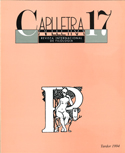Lexicografia i models lingüístics: les teories lingüístiques i el lèxic
DOI:
https://doi.org/10.7203/caplletra.17.7394Palabras clave:
lexicografia, models lingüístics, lèxic Resumen
Resumen
In this paper a discussion is offered of the relation between linguistic theories and lexica. It is shown that linguistic theories imply particular approaches to the lexicon from which particular ways of conceiving the lexicographer’s work can be inferred. To this end a few linguistic theoretical models are examined and their idea of the lexicon is reviewed. Obviously it is beyond the scope of this paper to discuss the approach to lexicon of all different linguistic theories developed during this century. Consequently a few models have been chosen for examination which nonetheless are quite representative of the main phases of the recent history of linguistics. After a very short discussion of the characteristics of traditional grammar, the paper starts the discussion with structuralism and then moves over to the examination of some of the linguistic theories that can be broadly considered «generative»; three basic stages in the development of Chomsky’s approach are reviewed, i.e., the ones represented by Syntactic structures, Aspects of the theory of syntax, and Lectures on government and binding; and finally the discussion ends with an examination of LFG (Lexical-functional grammar) and HPSG (Head-driven phrase structure grammar) which are two of the emerging theories are that have originated in the linguistic millieus most influenced by computational linguistics.
 Descargas
Descargas
Descargas
Cómo citar
-
Resumen447
-
PDF (Català)257
Número
Sección
Licencia
El autor o autora que dirija un trabajo a la redacción de Caplletra para ser publicado tiene que ser la persona titular legítima de los derechos de explotación. La legitimación para la publicación del trabajo tiene que incluir también las imágenes, las tablas, los gráficos y otros materiales que puedan complementar el texto, con independencia de si es su autor o autora.
Copyright. Al publicar el trabajo en la revista, el autor o autora cede a Caplletra. Revista Internacional de Filologia los derechos de explotación (reproducción, distribución y comunicación pública), tanto para la edición impresa en papel como para la versión electrónica.
Todos los trabajos publicados en Caplletra se encuentran bajo una licencia Creative Commons del tipo Reconocimiento-NoComercial-SinObraDerivada 4.0.
RESPONSABILIDAD
Caplletra. Revista Internacional de Filologia no se identifica necesariamente con los puntos de vista sostenidos en los trabajos que publica.Caplletra. Revista Internacional de Filologia declina toda responsabilidad derivada de cualquier vulneración eventual de los derechos de propiedad intelectual que pudiera ser llevada a cabo por los autores o autoras.






